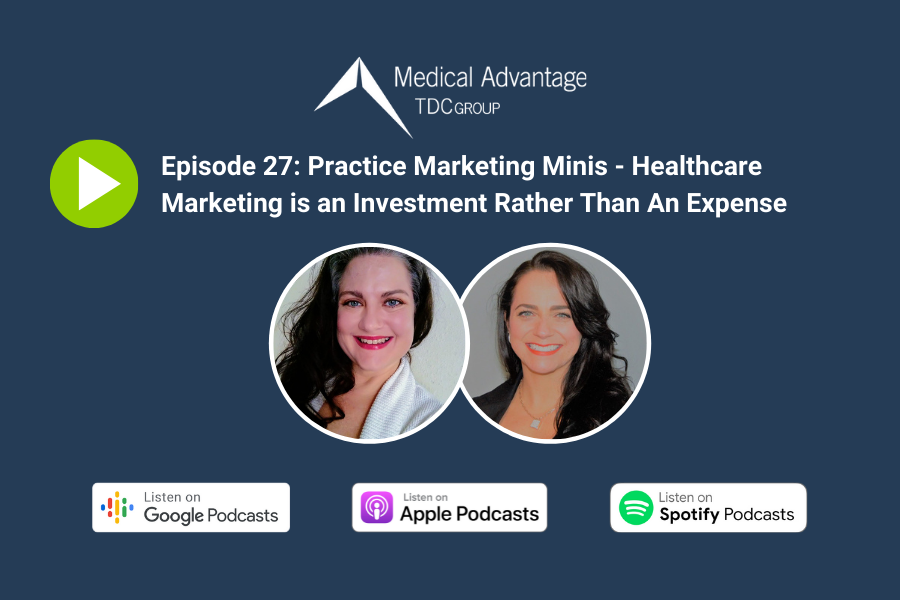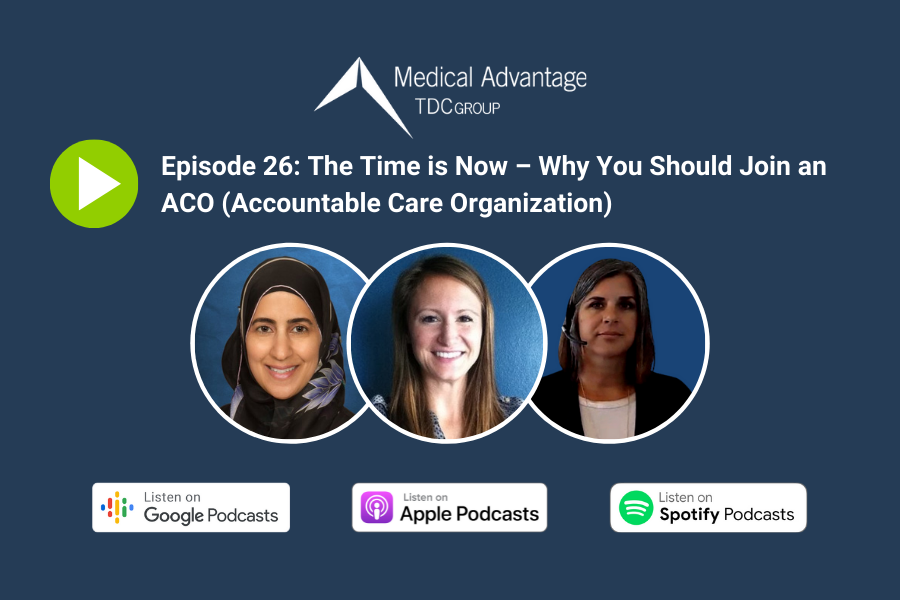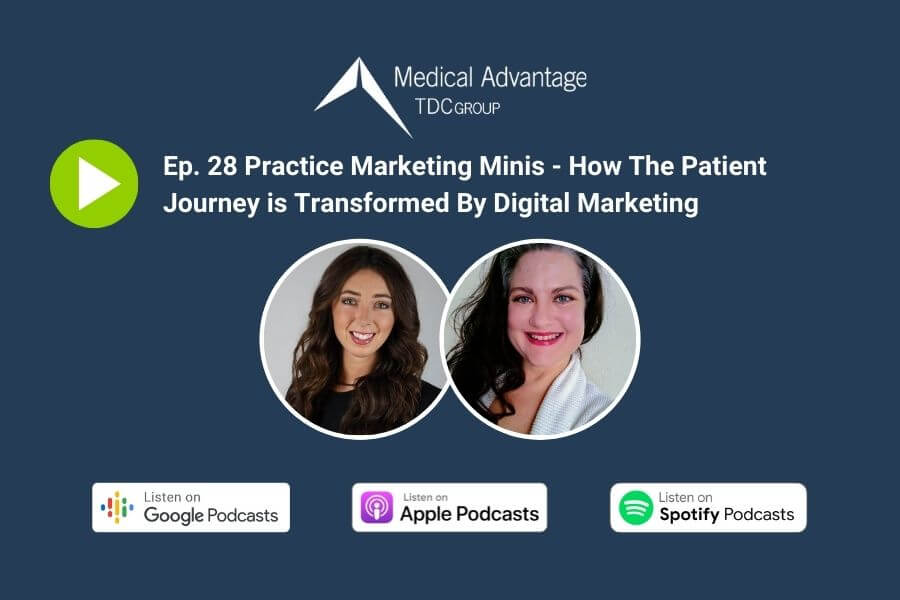No healthcare business plan is complete without marketing, but healthcare marketing is more than just a line-item budget – it is an investment necessary for long-term sustainability. Consistent marketing nurtures your brand, keeps your healthcare business competitive, and helps you connect with the right patient as patients look for the right provider for themselves.
In the palm of their hand, a patient has everything they need to find a new provider and stay engaged with a practice. When you are not investing in your online visibility, it is hard for patients to find you, and some may question your competency if you lack an updated website or good reviews. For some healthcare consumers, they may only choose a provider that shows up online, even forgetting about the medical offices they pass every day. We now make our everyday decisions with the help of our mobile devices, and building a strong online presence introduces your practice to prospective patients.
In this episode of the Medical Advantage Podcast, we kick off our practice marketing series based on our new eBook, hot off the presses and free to download: The Complete Medical Practice Digital Marketing Success Blueprint. Rebekah Duke, marketing creative and senior copywriter hosts this episode’s guest Stacey Hatcher, healthcare marketing expert and consultant, to discuss reframing our thinking about digital marketing. Are you just cutting a check and hoping for the best or are you treating this as an investment that necessitates a return?
Stacey walks us through the medical marketing journey from how much to spend, to how long it takes to see results, and what is at play in the digital space during ramp up time. Sometimes starting small is the right way to go, but when you have scalability in mind, you can invest more as you go to see even greater results. She also offers examples of how digital marketing equips practices to maintain a competitive edge.
This is the latest episode in the Medical Advantage Podcast, where each we take time each episode to discuss the ideas and technologies changing healthcare, and the best practices your organization can take to stay productive and profitable. Subscribe wherever you get your podcasts to ensure you never miss an episode. Download our free practice marketing eBook here!
Contact Our Team Today
Full Episode Transcript
Medical Advantage Podcast: Welcome to the Medical Advantage Podcast, where you can hear healthcare professionals, expert consultants, and industry thought leaders discuss the exciting new ideas and technologies that are changing the business of healthcare. Tune in to each episode as we hear from some of the most innovative minds in medicine about the future of healthcare and how your organization can stay profitable, efficient, and on top of best practices.
Rebekah Duke: Hello, and welcome back to the Medical Advantage Podcast. I’m Rebekah Duke. Here to host the kickoff episode of our Medical Practice Marketing series. Based on our recently issued eBook, the Complete Medical Practice Digital Marketing Success Blueprint, we’ll have some illuminating conversations with experts about aspects of the blueprint in this series. For those of you new to our podcast and new to us, Medical Advantage is a healthcare services company offering solutions for medical practices, specialists, groups, and private equity, all who would benefit from practice marketing strategies.
Today’s guest here to talk about marketing as an investment is Stacey Hatcher, our expert and practice marketing consultant. Stacey helps providers from a variety of different backgrounds reach their practice growth goals. Welcome, Stacey.
Stacey Hatcher: Hi, Rebekah. How are you?
Rebekah Duke: Pretty good. How are you doing?
Stacey Hatcher: Good. Thank you.
Rebekah Duke: Thank you for being here. So today we set our sights on the tug of war between two different ways of looking at marketing. One that it’s just a line item expense, and the other is that it’s a must-have investment. Marketing is no longer just cutting a check and crossing your fingers for the best. It’s about being on a trajectory for growth and reaching specific goals. Some may inadvertently harm their practice health by neglecting marketing when really marketing is essential to long-term sustainability.
So let’s dive in. Stacey, as a digital marketing consultant, highly engaged in the healthcare space, can you share a bit about the budget dilemmas, practices face these days, especially in our competitive landscape?
Stacey Hatcher: Marketing used to be a throw it all at the wall and kind of see what sticks. And it’s no longer that way with digital advertising, because we can get so targeted with our approach. There’s a couple different things that I look at, is if it’s a new practice and they went through banks to get loans and things like that, they kind of have to have a marketing plan. In order to get that loan, they have to show the bank that this is a feasible option and that there’s gonna be a return on this investment.
So they wanna see that you have a good marketing plan in order to say, okay, they’re doing what they need to do to grow the business. So if the banks are seeing it as an investment. Because anything you’re investing in is basically putting money into something, looking for a profit. Well, all marketing is that, it’s an investment.
It’s you’re looking to put money into marketing for a profit, to gain a profit. Now, it all depends on what type of marketing and how smart you are with your marketing dollars of how big that ROI is. Hopefully that ROI, that profit, is more than what you put into your budget, what we’re ideally looking for.
And there’s a bunch of different factors that go into that, but if we’re thinking about it as “I’m putting money into this to gain more money out of this,” it boils down to, would you not give somebody your $10 if you knew you could gain $20 from that $10? And that’s what marketing really is.
You’re looking to see how’s the best way that we can put the marketing budget together to where I’m making more than what I’m spending on my marketing. Any company that opens up, even if you put a marketing budget together, and you’re like, I don’t really have to stick to this. There’s a reason and a science behind it that you are putting money into something to grow your business.
You can’t any longer just open a business and expect people to walk in the door. You have to put something out there that says, “hi, I’m here and this is what I do,” and kind of reach out to the people that you’re trying to get in front of. Yeah, so it’s definitely a core component of your business plan. Yeah.
Rebekah Duke: So what does a typical practice budget look like?
Stacey Hatcher: So I’m looking at the average healthcare industry as a whole. The average marketing budget is around a 7.5% of their monthly revenue. And because digital advertising has become so big lately in the last 10, 15 years, that the digital is growing substantially, I believe it’s growing, its 16% over any print advertising. And 4.8% is what you should allocate towards your digital marketing budget of your monthly revenue.
Rebekah Duke: Yes. And that’s just giving them an idea. It could vary depending on what your goals are?
Stacey Hatcher: Right? It could. You could have a larger budget depending on if you’re a brand new business and you really wanna hit the ground running, or if you’re looking to reengage your current customer base, things like that. Or how you allocate, how much should be, like if you’re brand new, you really need to go out there and tell everybody that I’m here to really let the community know to show, share your services, things like that. You’re gonna need a higher budget than somebody who’s been in business for 10, 15 years, has a good word of mouth, has been doing some digital advertising. So it really varies.
Rebekah Duke: Yes it’s helpful to distinguish between those two different scenarios and stages of the brand. Definitely. Does a practice have to have a big budget to make progress?
Stacey Hatcher: Not necessarily. And I look at it from the point of, I know that there’s so many people that have been kind of jaded by marketing companies or marketing, digital marketing and things like that, that they’ve either tried to do on their own or had somebody else do for them.
And so they’re like, but I just don’t have that $10,000 a month to spend but you don’t have to. As long as we’re setting expectations to say, if you have a $3000, this is what you can expect. If you have a $10,000, this is what you can expect. So it’s really all about setting the expectations. But I do believe in, especially for somebody who’s really just shy and they’re like, I just don’t know, I just I’m really kind of, I’ve had a bad experience with other companies and I just don’t have that in my budget for it to not work.
Then start small, know what the expectations are, look at your key performance indicators and know that, need to have at least five leads or I need to have at least a hundred new patients, things like that. And setting those to where, you know, as the practice, and then we, as the marketing company would say, this is what you can expect. So I do believe a lot of times starting off small, building that trust with the marketing agency or the marketing person, and then growing from there. And the more you’re getting in, the more you put out.
Rebekah Duke: Definitely you gotta start somewhere and think about it as being scalable in the future.
Stacey Hatcher: Right. Right.
Rebekah Duke: What are practices risking or leaving on a table by not building their online visibility?
Stacey Hatcher: Well, today there’s so many competitors out there, and it’s no longer about building a great location and hoping people will come because most people, especially if you’re looking for doctors or you’re looking for dentists or things like that, you’re going online before you even leave the house.
You’ve already done the research online, you’ve plugged it into your maps and you’re ready to go once you leave the house. So they’ve passed by five or six other dentist’s office but they’ve already got it in their sights where they’re going. They’ve read the reviews, they’ve gone online, they’ve put it in their maps and that’s the one they’re going to.
Even people that are like, oh, but I have a good word of mouth. Even if your best friend gave you this doctor’s office that you’re like, yes, this is the person you need to go to. Even the consumer, even the best friend, is going online to say thank you, but I’m gonna go check and make sure that the reviews are good. So they’re going online to check reviews, they’re going online to see if they have a website, to see what the office looks like, to see what, you know, the, the mission or the values are of that company. To see say that it’s a legitimate business, it has a great location, it’s in a great area.
Or you know, it’s not, they don’t have a website at all, they have bad reviews, so it’s no longer just word of mouth because even after word of mouth, they’re still going online to see what everybody else is saying.
Rebekah Duke: Yeah. Can we make any decisions without our phones these days?
Stacey Hatcher: No.
Rebekah Duke: It’s amazing how much we rely on Google and other resources online to make everyday life decisions. So how does digital marketing nurture your brand in the long term?
Stacey Hatcher: So two different avenues. The how and then the how long. So the how, there’s several different ways that digital marketing nurtures your brand, but just a couple that come to the top of my mind are reviews. Everyone’s going online nowadays to look at reviews, whether it’s a restaurant or a dentist office, or a doctor’s office.
Everybody’s looking for reviews. They’re also going on to check your website or to check your branding to see what the image is of your business, you know, is it the type of business that as the consumer, matches my values and my beliefs and ,kind of, am I your ideal client?
Like you have an ideal client as a practice, but also the consumer has an ideal practice that they’re looking to visit, and then it is the fastest way for a practice. To show that they’re keeping up with new trends. Digital advertising is so fast changing that you can go and and call your provider and say, “Hey, I wanna change my ad, and in 24 hours you have a new ad.”
So it’s really quick about saying, we’re up to trend, we’re up to to par with all of these new trends that are coming out. You know, because if you’re keeping up with your industry and then somebody that’s looking for a cardiologist or a dentist, they’re saying, but does this provider carry these new things that are out there?
So it’s an easy way to quickly update your image and say, but we are taking these and we are changing, we are evolving. You can change your messaging of an ad or say, what’s on your website? You know, maybe there’s a new different facial that’s out. You know, like dermatologists, I know they have HydraFacial, so how fast can we go on our website and show that we now do HydraFacials, kind of things like that. It’s so fast changing that it allows you to go online to show those that you’re growing with the the industry.
And then the, how long, is the three to six months. So I always like to tell my clients, don’t expect to put any advertising out on digitally on the internet and expect a return within the first week or the first month per se.
Again, that’s where your key performance indicators come into play. Knowing what to expect your first month, second month, third month, so forth. But your three months is gonna be, yes. I’m really starting to see the return on my investment. It’s not that you’re not gonna see anything on those month one and month two, but month three is really gonna be okay, this is where I wanna be.
Six months is optimal. You’re saying this campaign has been running, it has been learning from itself. Everything is going into the AI world, so everything on the internet is learning from the previous month. The ads are learning, the, the posts are learning. Social media, Google, they’re all learning from the month before.
And so that, I like to tell everybody, at least give us three months to prove that this is working the way you want it to. Six months is when you’re gonna see optimal results.
Rebekah Duke: Thank you for walking us through that practice marketing journey. Do you have any final thoughts?
Stacey Hatcher: Just looking at it as what it is. Is that it is the investment that you need to make in order to make your company grow. And it doesn’t have to be a huge budget to start. I mean, I think you just start off slow for some people and then grow from there. So don’t look at it like this big, daunting expense. Look at the investment that it is, but then knowing how to set your expectations for the budget that you do have.
Perfect. Well, that’s our time for today. Thank you so much, Stacey, for being here and sharing your industry insights. For more direction on how to invest wisely in practice marketing, download our eBook found in the eBook section at medicaladvantage.com. Join us for our next episode on Practice Marketing coming soon.
Medical Advantage Podcast: Thanks for joining us this week on the Medical Advantage Podcast where we discuss the ideas and technologies changing healthcare and what they mean to your organization. For more information, visit us at medicaladvantage.com and make sure to subscribe to the podcast on iTunes, Spotify, or wherever you get your podcast, so you never miss a show.







